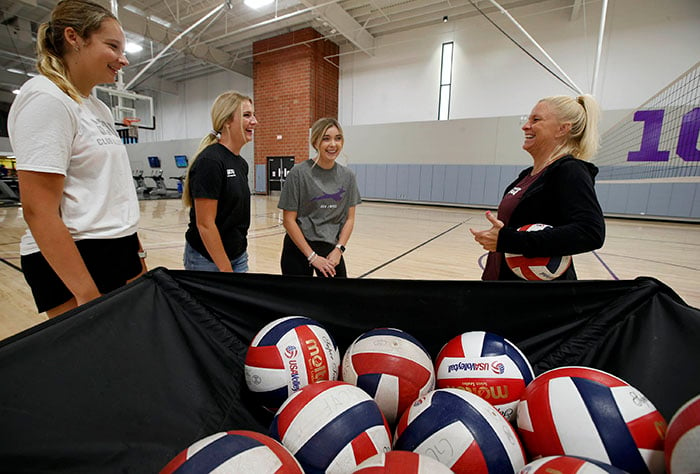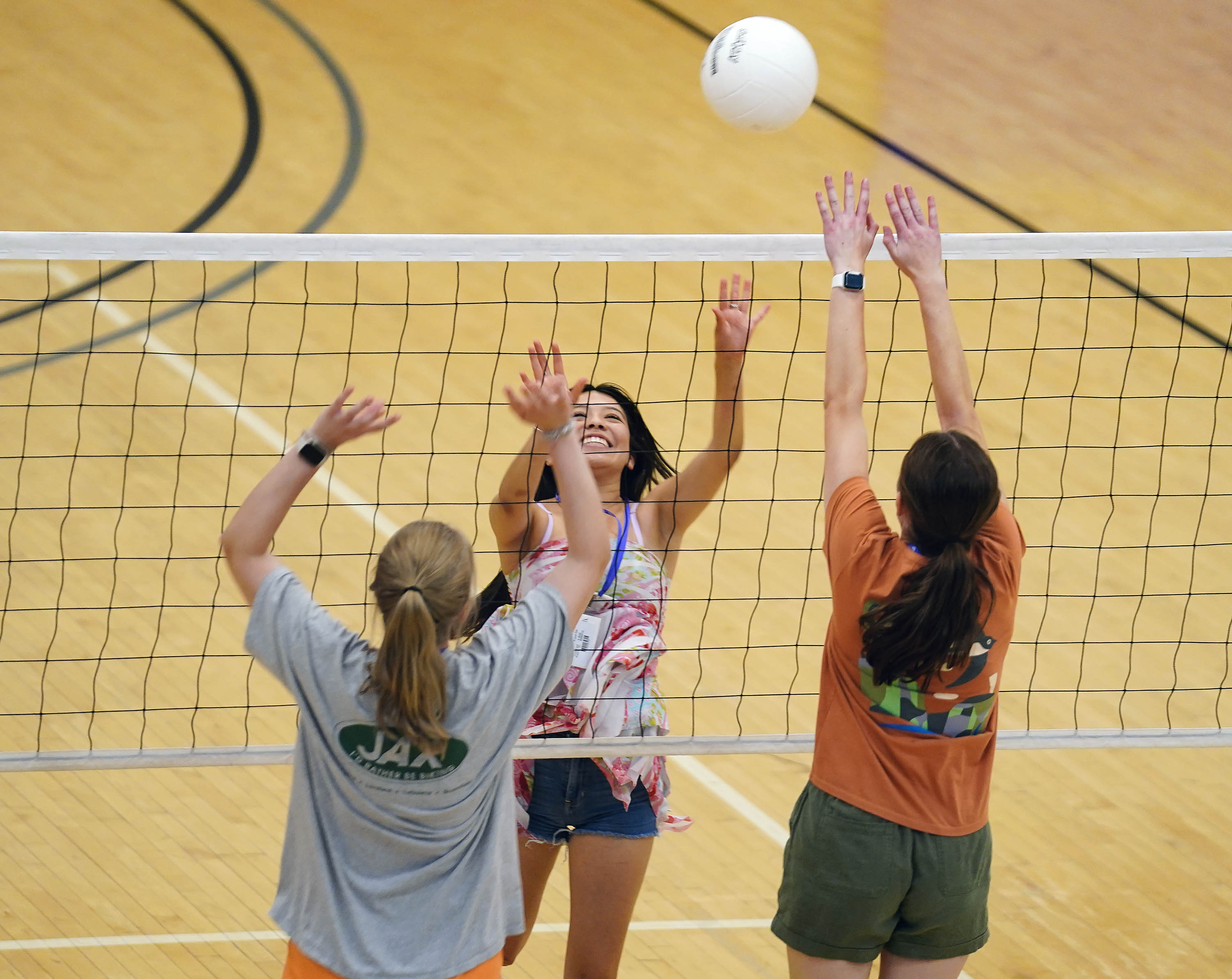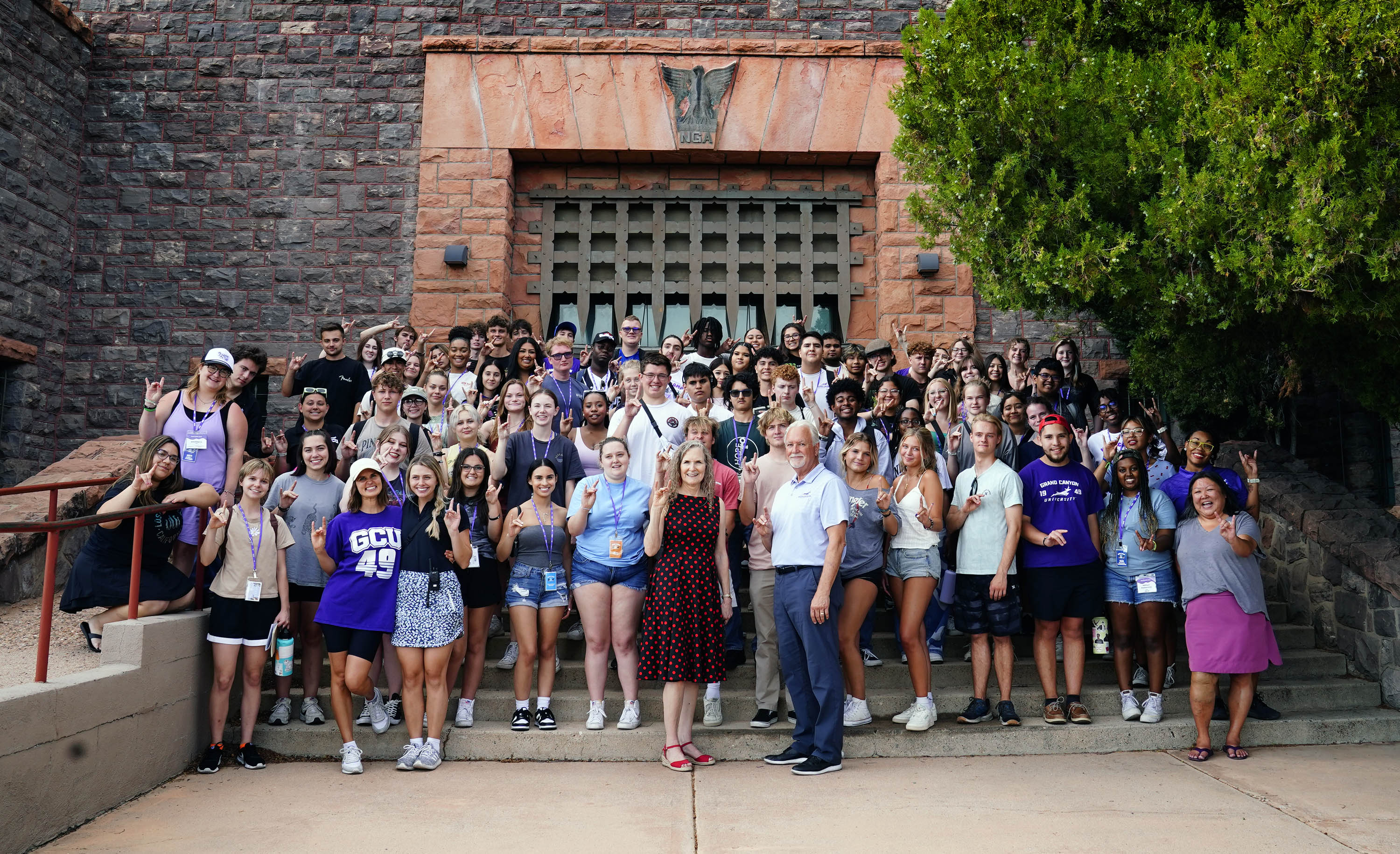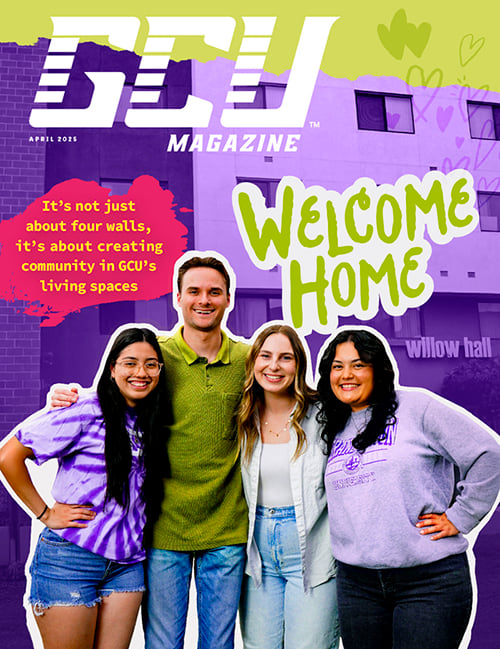
Editor's note: This story is reprinted from pages 14-19 in the August issue of GCU Magazine. To read the digital version of the magazine, click here.
Story by Rick Vacek
Photos by David Kadlubowski
GCU Magazine
The mission statement of Grand Canyon University’s Diversity Council declares that it is “composed of faculty and staff working in a collaborative effort, together with students, to promote and enhance the University’s efforts to maintain a diverse and unified campus community in alignment with the University’s Christian mission and vision.”
Note those last nine words. That’s the key. GCU’s approach to diversity starts there.
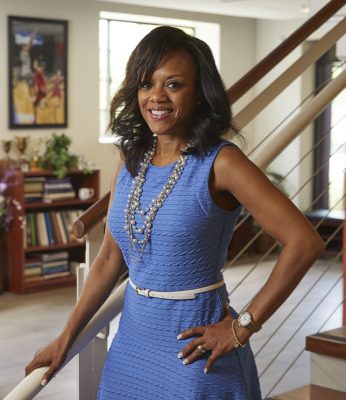
“Spirituality is the lens through which we view and accomplish the work of diversity – ‘Loving your neighbors as yourself,’ Mark 12:31,” said Dr. Antoinette Farmer-Thompson, the Diversity Council chair. “Yes, diversity means dialogue. But for us it also means, ‘How do you really help the people around you, how do you have real impact – not just for today, but for generations?'
“High quality, affordable education is one of the best ways – if not the best – of bridging equity gaps. That’s the foundational piece for our diversity efforts and, ultimately, truly being united in purpose, by purpose and on purpose.”
The Council, formed in 2015, has fostered an environment of open dialogue and thoughtful discussion with numerous opportunities for students to join in. And this year, more than ever, a traditional campus where 47 percent of the student population is diverse is focused on continuing the conversation with all students, new and returning, of every ethnicity, age, religion and socio-economic background.
The goal is to make them all feel included – everyone, without exception. Right from the start of Welcome Week, students will hear about the Diversity Office, opened last spring (it’s Room 150 in the Student Life Building). They will hear that diversity outreach always has been and always will be a priority, in light of GCU’s Christian worldview.
They will hear that diversity at GCU extends beyond the campus gates and right out into the neighborhood, where students regularly volunteer their time and energy. In fact, many students from the University’s multicultural neighborhood are on campus because of the University’s efforts to make a college education affordable for everyone.
They will hear about the clubs devoted to diversity.
They will hear why diversity is so important to the Associated Students of Grand Canyon University (ASGCU) and the Student Engagement team.
There will be socials devoted to international students and those from diverse backgrounds, including a cultural celebration that is a collaboration of the Black Student Union, Latino Student Union, Hui Aloha (formerly the Hawaiian Club) and Filipino-American Student Association.
Very intentional. But what’s interesting is how this all came together. Diversity affects students even before they set foot on campus, and it has happened organically.
*****

“For in Him all things were created: things in heaven and on earth, visible and invisible, whether thrones or powers or rulers or authorities; all things have been created through Him and for Him. He is before all things, and in Him all things hold together.” – Colossians 1:16-17
No one is more passionate about the importance of diversity than GCU President Brian Mueller.
“It has always started with President Mueller,” Farmer-Thompson said. “I think it was always his destiny to be here. He loves God. It’s part of who he is, and as a Christian man, he lives out a Christian mission. Everything he does is with the good of people in mind. Therefore, diversity to him is not something that you think about and check off and have a strategic plan. The man has done it, just based on who he is from a spiritual perspective. It’s his heart for people.”
One of the reasons behind the University’s 10-year freeze on traditional campus tuition is Mueller’s fervent belief that America doesn’t promise equality, it promises equality of opportunity. He says students and families from all socio-economic backgrounds should have access to college and, in turn, a good job.
“What I’m most proud of in what we’ve done here is that we’ve set out to make private Christian higher education affordable to all socio-economic classes of Americans,” he said. “The reality is, education is getting unaffordable and therefore inaccessible to large segments of the population. Even state universities are becoming out of the reach for many people, but certainly private schools are way out of reach for most Americans.”
The tuition freeze has made GCU the exception and has resulted in a student population that is 28 percent Latino and seven percent African-American – both overrepresented in the lower socio-economic strata.
“It’s not that we came up with slick marketing plans to attract Hispanic and African-American students here; we just came up with a financial model that made it affordable,” he said.
“I think the thing that’s most important about this is that it combines the free market system with the Christian worldview. You put those two things together and you create an institution that’s based on Conscious Capitalism principles, and then diversity happens. It’s organic, which means it’s probably going to survive well into the future.”
*****
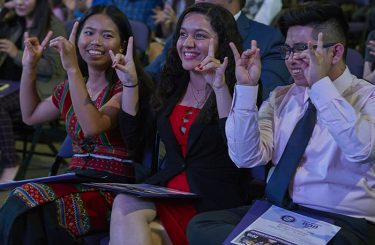
“Live in harmony with each other. Don’t be too proud to enjoy the company of ordinary people. And don’t think you know it all!” – Romans 12:16
The tuition freeze is only part of GCU’s commitment to diversity.
It also serves its predominantly Hispanic inner-city community with the Learning Lounge, which provides free academic assistance for K-12 students. That led to the Students Inspiring Students initiative, which already has awarded 300 full-tuition scholarships to neighborhood students. Of the recipients, 91 percent are people of color, who then pay it forward as college students by working 100 hours per academic year in the Learning Lounge.
And local parents have another way to gain access to an education they otherwise might have considered unattainable for their families: If they work for the University, their children’s tuition is miniscule.
Part of the challenge is increasing awareness among parents who don’t speak English. One of the ways the University does that is with Casa Abierta (Spanish for “open house”), where monolingual parents are given a complete rundown of tuition, benefits, how to budget for college and how to apply for student loans.

Emily Belt, Regional Director of Operations, Traditional Campus, takes great satisfaction in enlightening parents and students during the enrollment process and then continuing the conversation through the college experience. She remembers what it was like for her when she attended a small Midwestern college and had to figure out how to pay for it.
“No one ever talked to me about how I could leave school and not owe a ton of money,” she said. “No one ever discussed loan amounts with me. They just said, ‘You can’t pay for this? Here, this is what you need to sign, and we’ll get you a loan that pays for the rest of it.’ “We put plans in place where they can actually afford to go to college, and we teach them how to pay it off while they’re in college. Now they’re not starting off in a hole.”
A key part of those plans is giving students access to jobs, both on campus and in the community.
Approximately 2,500 students are employed by GCU, beginning a process that focuses on preparing all students, no matter their background, for what’s ahead in the working world.
Students who want to work elsewhere can access the Academic and Career Excellence Center’s Jumpstart for Jobs program, which gives them everything they need – resume assistance, interview and business etiquette tips, and instruction on how to act professionally – to get in the door and make a positive impression once they’re there.
There’s an annual clothing drive to get students the proper business attire (an acute need for some less affluent students), and they even can do mock interviews with representatives from outside companies to get a better feel for what the experience will be like.
“That, to me, shows we’re invested and supporting people who just need more support,” Belt said. “They don’t need handouts. They’re not less capable or less qualified. They just need a different level of support.”
*****
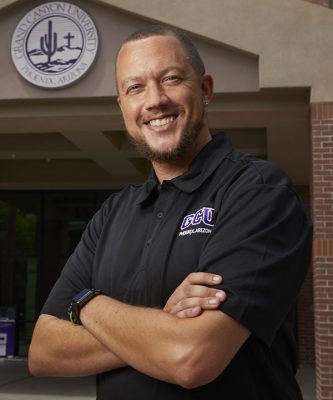
“Love the Lord your God with all your heart and with all your soul and with all your strength and with all your mind; and, love your neighbor as yourself.” – Luke 10:27
When Belt and Student Services Manager Timothy Jones got the Diversity Office started last spring, the first thing they discovered was how much students didn’t know about what GCU already was doing in terms of diversity.
“People would say, ‘I wish we did this.’ And we’d say, ‘Well, we DO do that,’” Belt said.
Said Jones, “We weren’t trying to reinvent the diversity wheel. Most of the wheel is already in motion.”
The office’s location, adjacent to that of Jeremy Mack, Director of Student Engagement, speaks of its importance.
“What the office provides is, number one, a location for students to go to whenever they have an area of concern, a comment or a thought or just need a place to hang out and have a conversation,” Mack said. “It provides a physical space and a phone number. It connects students with the resources that already exist or creates resources that need to exist.”
Numerous programs already existed.
“We had a history. There was this component to the student experience that addressed and celebrated and affirmed the minority groups across the campus. From my vantage point, it was a wonderful thing to see unfold,” said Dr. Tim Griffin, Pastor and Dean of Students.
“But it’s OK to think through and take a step back and say, ‘Can we add some components to make this better?’ I think that theme has been played out in the development of the Diversity Office.”
One of the activities organized by the Diversity Office last spring was a speaker series with top-level, career-oriented topics, such as “Turning Your Vision into a Business,” “Pathways to Medical School” and “Pathways to Law School.” Diverse members from the Phoenix area were brought in to share their stories and give students a glimpse of what that option might look like.
ASGCU staged Human Library, where a wide variety of students shared details of their backgrounds and broke down the walls of stereotypes, and Diversity Speaks, a series of talks about important topics related to the subject. There was a full week of diversity activities, with each day devoted to a different ethnic group, as well as a one-day Cultural Fest that featured various types of dance.
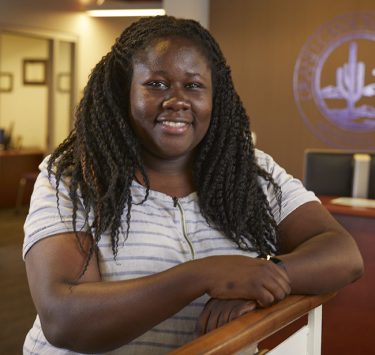
*****
“After this I looked, and there before me was a great multitude that no one could count, from every nation, tribe, people and language, standing before the throne and before the Lamb.” – Revelation 7:9
But perhaps there is no better example of how diversity plays out on campus than the African Student Association, which meets every other week. When it was formed two years ago, advisor Ruth Nsubaga stressed to the students that she wanted it to be more than a social club – she wanted them to gain new knowledge, learn new skills. They eagerly agreed.
For the first semester, that means bringing in outside speakers. The students become the speakers in the spring semester, sharing about their cultures.
“The cool thing about our club is that it’s not generally just African students – they can bring their friends,” she said. “All these different people are learning about all these different cultures. They’ve learned a lot of basic concepts about how to engage with each other and how to engage in conversation because there will be disagreements.”
And when they don’t see eye-to-eye, Nsubaga reins them in by reminding them of their Christian worldview and by practicing the Stephen Covey principles she espouses. “I need everyone to live out biblical principles and then the ‘Seven Habits of Highly Effective People’ and I think we’ll be fine,” she tells them. None of this would be possible without a student population that is on board with the importance of listening.
“Our students have embraced the diversity,” Mueller said. “We have all socio-economic classes represented and so many different racial and ethnic groups are represented, and yet when people walk through our campus, the most frequent comment we get from families is the students are kind, they’re considerate, they’re respectful, people seem happy here, we want our son or daughter involved in this kind of environment.
“Not only is it diverse; diversity has happened organically, which means it’s sustainable but is producing a very healthy culture.”
Students will get a taste of that culture right from the start of Welcome Week. ASGCU President Noah Wolfe is determined to see to that. “We want people to know that the minute they drive onto this campus and get out of their car, that they are part of the family, that we care about them and that they are valued regardless of who they are,” he said. “We’re going to give them incredible Lope treatment.”
That’s the kind of treatment Farmer-Thompson was talking about when she referenced the foundational piece for GCU’s diversity efforts. Her final thoughts on the matter delved even deeper:
“When I think about spirituality and the conversations we have had around diversity, for GCU these are inextricably linked. Dating back decades, we have always been mission minded and mission driven, which has resulted in a very diverse campus and team of people working here. Being united and being diverse is who we are.
“Many people miss the obvious: We have lived out our Christian beliefs and values through efforts that have truly transformed the lives of our students, staff, faculty and community. That is the truest and most effective way an organization can demonstrate diversity.”
GCU UNDERGRADUATE ETHNICITY
Traditional campus (fall 2017)
White -- 50%
Hispanic -- 28%
Black or African-American -- 7%
Two or more -- 6%
Asian -- 4%
Unreported -- 4%
Other -- 2%
Contact Rick Vacek at (602) 639-8203 or rick.vacek@gcu.edu.



